Passion's Bright Fury Read online
Page 5
“For how long?”
“Indefinitely,” Jude said with a shrug. “Until I get what I need.”
“That’s a significant commitment,” Sax observed, wondering if the filmmaker had any idea how disruptive that kind of schedule was going to be. “In time and energy. Every third night, sometimes all night, can wear you down pretty fast. On holiday weekends like this one we may even do twelve-hour shifts, depending on call-outs and how busy we get in the OR. That’s a lot of lost sleep.”
“You do it,” Jude pointed out.
“It’s my job.”
“Mine, too.”
Sax studied her, then grinned. “Point taken. Forgive my professional chauvinism.”
“It’s hard to be angry at someone who so readily admits it when she’s being a jerk.”
For a moment, Sax simply stared at her. Green eyes, sparkling with challenge, met hers, and she wondered what it was about this woman that was so damn appealing. She decided it might be the fact that she had yet to back down over anything. “Aren’t you afraid that you’ll offend me, and I’ll be uncooperative?”
Jude laughed. “I missed the part where you’ve been cooperating so far.”
“I’ll try to be more obvious, then,” Sax replied dryly, but her tone was playful.
“Tell me something, Dr. Sinclair,” Jude said, still thinking about the battlefield images. “Tell me about the enemy.”
“Enemy?”
“Yes. The enemy you face when a patient is delivered into your trauma bay. What is it?”
“Time,” Sax answered immediately, not even stopping to consider where the question had come from. “A true trauma emergency is a race against time—blood seeps away, organs die, damage becomes irreversible.”
“How much time do you have? To make decisions, to make a difference?” Jude asked softly, watching something in Sinclair’s face change. The surgeon was looking past her, her gaze slightly distant, as if she were reliving something in her mind. Jude did not want to distract her; she did not want to let her know how much her expression revealed.
“Seconds. Sometimes not even that. You act unconsciously, instinctively.”
“And if you’re wrong?” Her voice was softer still.
Sinclair’s blue eyes snapped into sharp focus and met Jude’s. “We have a saying in surgery, Ms. Castle—better wrong than uncertain. Hesitation, for a surgeon, can be deadly. If you can’t live with your decisions, you need to find another line of work.” She turned to leave, saying, “I have trauma rounds in thirty minutes.”
“What about Deb Stein?” Jude called after her, not wanting to let the moment pass. She needed to understand what went on beneath the surface, so she could hunt it out and capture it with her lens. “How will you know if she can make those kinds of decisions?”
Sax stopped and faced her. “You’re interviewing me again.”
“Is this year some kind of test for her?” Jude persisted, ignoring the comment.
Mildly exasperated at the other woman’s tenacity, Sax shook her head. “No. Deb has proven herself already. This is additional training for her, above and beyond the basic requirements for a general surgeon to become board certified. She’s already completed six years of resident training—six years of a system designed to wear down and wear out anyone not physically and psychologically fit for the specialty. The attrition rate is high in the first two years of a surgery residency for a reason.”
“Sounds abusive,” Jude observed, still probing.
“Some people would call it that. But better to find out before someone is set loose with a knife in their hand whether they can take it or not.”
“So what is the purpose of this year, if Deb is already a competent surgeon?”
“I need to teach her to think on her feet, to make the right decisions without all the information, to trust her judgment. If anyone is tested this year, it will be me.” Sax stopped abruptly. Where in hell did that come from? Why is it every time I talk to this woman I end up saying things I don’t mean to? She’s downright dangerous. Curtly, she said, “I’m sorry. I’ll be late.” She left before Jude could penetrate her guard again.
For several seconds Jude stared after her, feeling short of breath. She tried to tell herself it wasn’t because of the passion she had glimpsed in the depths of Saxon Sinclair’s eyes, or how very attractive she found it. Surely it was only the woman’s professional dedication that left her breathless.
Chapter Six
Personal Project Log—Castle
July 1, 7:40 a.m.
I’m starting to get the picture now. Trauma surgery is the medical equivalent of the Special Forces or the Green Berets or something. At least that’s the way Sinclair sees it. She’s the commanding officer, the residents are her troops, and the war is against death. Jesus. I never thought about that before. It takes some kind of ego to take that on. She’s got it, that’s for sure, but I wonder how that happens. Where does that confidence, that absolute certainty, come from? [Note: Need more background on Sinclair. She and Deb are the brackets of this frame, the beginning and the end.]
That’s the point of this year, I guess—to take Deb, the green recruit, and turn her into a leader, a warrior. [Note: Title second episode “Boot Camp.”] This is the angle—the hook. This is the analogy that will get people excited, that will keep them coming back week after week. That and the human interest aspect of following Deb through the process. She’s perfect for it because she’s so girl-next-door. They loved her during the Olympics, and the up-close-and-personal interviews with her were a big hit. [Note: Call Sinclair’s secretary for her CV. Arrange an on-camera interview with Sinclair regarding the necessary personality traits of a trauma surgeon. How did she choose Deb?]
July 1, 8:15 p.m.
“If I have to eat cafeteria food every third night or more often for the next six months, I want hazard pay,” Melissa Cooper groused. “It’s bad enough that my social life is going to go to hell, but with that fare, so will the rest of me.”
“I told you to take a few hours off for dinner, or we could have ordered takeout,” Jude pointed out, leafing through a surgical journal she had found under a stack of file folders on the counter. The article titles were mostly indecipherable to her, but the pictures were fascinating. She was sitting in the trauma bay in one of the ubiquitous swivel chairs, her feet propped up on the wastepaper basket. Nearby, Mel fiddled with her equipment.
“Problems?” Jude asked.
“No, I ran a video-sound synch check earlier, and it was fine. I just wanted to make sure we had the microphone settings optimized to capture everything we could. It would be better if we had off-camera mikes, too.”
“I agree, but I don’t think it’s technically possible in the space that we have here. Besides, it will add to the immediacy and the atmosphere if our sound is a little rough. We want this to come across like a frontline, in-the-trenches kind of documentary.”
Mel straightened and stretched. “That’s what you’re going to get if I have to rely on only two cameras and wear one of them.” She pulled a chair out from under the long counter and regarded Jude contemplatively. “How are things with Lori?”
“Fine.” Surprised, Jude had responded automatically. “Why?”
“Just wondering,” Melissa said with a shrug. “You’ve been seeing her, what? Four or five months?”
“Six.”
Melissa whistled. “Sounds serious.”
“No,” Jude said slowly, realizing that she rarely gave her relationship with Lori much thought. It just is...what it is. “Not really.”
“Is she seeing anyone else?”
“Not that I know of, but she might be. We never made any exclusivity agreements.”
“Are you?”
“No.” Jude eyed her friend and colleague suspiciously. “I barely have time to keep up the one relationship I have as it is. So why the twenty questions, Mel? Are you planning on asking her out?”
“God, no.” Melissa la
ughed. “She’s hot, but she’s way too establishment for me. Just curious as to what’s going on with you. If I were going to ask anyone out, it would be Sinclair. She’s got a look about her that says she could be interesting.”
“Interesting?” Jude asked carefully, trying to ignore a sudden twist of jealousy. You’ve got absolutely nothing to be jealous about. What’s it to you if Melissa goes after Sinclair or anyone else, for that matter? You already have a girlfriend and even seeing her every few weeks is work. Besides, Sinclair is definitely not your type. She’s secretive and edgy and just plain difficult.
Oblivious, Mel continued blithely, “In case you haven’t noticed, she’s got a thing about control. I bet she’s the same way in bed.”
Jude definitely did not want to spend any time at all considering what Saxon Sinclair would be like in bed. She had to work around her for days at a time for the foreseeable future, and she needed to concentrate on work while they were together, nothing else. “Well, good luck finding out.”
“Is she available, do you know?”
“No idea.” Come to think of it, she didn’t know much about her at all. I really need to get her in an interview.
“Should I give you a detailed report?” Melissa teased.
“No thanks,” Jude responded more sharply then she intended. She hoped the photographer didn’t notice.
Before Melissa could comment, Deb and Aaron walked in together. “Hey,” they both said in greeting.
“Evening,” Jude answered, disappointed to see that Sinclair was not with them. “What’s happening?”
Deb joined them as Aaron began restocking the crash cart with drugs after unlocking the multidrawer rolling cart with his key.
“Nothing at the moment,” Deb replied. “Sinclair told me to tell you she’s arranging an on-call room for you. Maintenance is putting a couple of beds and a desk in a small office down the hall. You can sleep in there and set up some of your equipment if you need to.” She handed Jude several keys. “You might as well try to get some rest while you’re hanging around with us if nothing’s happening at night.”
“I don’t want to miss anything,” Jude said uncertainly.
“I’ll bang on your door if anything comes in,” Deb assured her. “We always have some warning when a trauma is on the way, because either the EMTs radio us or the chopper calls ahead.”
“Sounds fine, then,” Jude agreed. “If it gets to be late and it’s still quiet, I’ll definitely take you up on it.”
“I’ll second that,” Melissa added. She considered briefly that it might be handy in the coming months to have a room nearby with a bed available. She’d learned from experience that a little romantic diversion on an extended shoot could help pass the time quite nicely, and from what she’d seen so far, there was more than one possibility she wouldn’t mind exploring.
July 2, 2:29 a.m.
Jude felt as if she’d barely closed her eyes when a sharp rap on the door brought her upright in the narrow bed. Across the tiny space from her, Mel turned over with a mumble and buried her head under the pillow. Heart pounding, it took Jude a few moments to realize where she was and that someone was at the door. Crossing quickly to open it, she inquired, “Yes?”
Sinclair stood in the empty hallway looking wide-awake. “Five minutes, Ms. Castle. We have three coming by ambulance from a pileup on the bridge. There could be more—I don’t know yet.”
“Right, thanks.”
Sinclair was already moving off down the hall toward the trauma admitting area as Jude called over her shoulder, “Let’s go, Mel. We’re on.”
The next five minutes passed in what felt like seconds. By the time Jude and Melissa reached the trauma bay, Aaron and two other nurses Jude didn’t recognize were already waiting, garbed in protective gowns and gloves and pulling out instrument packs from tall steel cabinets. Sinclair and Deb were in scrubs and latex gloves. On the long counter lay the remnants of someone’s late dinner, scattered sections of the daily newspaper, and a chessboard, clearly abandoned in mid-game. Jude averted her eyes, but not before she had instantaneously absorbed the position of the pieces. White was about to be checkmated.
From across the room, near one of the treatment tables, Sax watched Jude Castle and her photographer prepare. In their own way, they were very much like her team, working together with practiced efficiency, almost wordlessly. Jude spoke rapidly into her tape recorder, apparently noting the date, time, and specific circumstances of the upcoming shoot. Melissa shrugged into a body harness that was clearly meant to support the heavy handheld video camera. As she helped to secure the DVCam, Jude affixed the microphone to it for simultaneous sound and video synchronization. Once that was accomplished, Melissa took up a position where she could record the entrance and the arrival of the patients and checked the angle of view on the built-in monitor. Jude stood just behind her, where, Sax presumed, she could direct the photographer to concentrate on whatever aspects of the upcoming resuscitation interested her. Smooth. Impressive.
Jude glanced over. “Are we okay here?” she asked Sax.
“I think so. Go for what you want. If you get in the way, I’ll let you know.”
“Sounds good.” Jude grinned. She didn’t doubt for a second that even in the midst of fury, Sinclair would have no problem making her wishes known. Her last act, before the doors slid open and the first of three stretchers careened into the room, was to wonder if the surgeon ever relinquished control to anyone...ever.
Chapter Seven
July 2, 2:43 a.m.
It started out as a fairly routine trauma situation, or so Jude surmised. EMTs and paramedics from two separate divisions had responded to a multivehicle crash. The first victims to arrive were a family of three.
“Try to get something on all of them, but concentrate on Deb and the little girl,” Jude directed Melissa as medical personnel converged on the gurneys.
Efficiently, team members moved each patient to a treatment table with the effortless choreography of long practice. As far as Jude could tell, all three family members were conscious, although both the mother and father were strapped to backboards with restraining cervical collars around their necks.
A blond child who appeared to be about five lay on the third stretcher, looking small and vulnerable amidst the monitors clustered around her. A large laceration extended from her scalp onto her forehead, and from where she was standing, Jude could make out the stark gleaming surface of white bone. Miraculously, the child appeared comfortable and not particularly frightened. She didn’t even seem to be crying, although tear tracks smudged her smooth cheeks.
Sinclair was directing the activity even as she began assessing the male member of the trio.
“Fisher, check the mother. Stein, get the girl.” She bent over the man, automatically performing the standard initial evaluation to confirm that he was breathing properly and that his pulse and blood pressure were adequate. While she worked, she shot questions at the paramedics who had lingered to watch the resuscitation. “What was the status in the field? Extrication times? Any hemodynamic instability or loss of consciousness?”
It sounded to Jude as if the handful of emergency personnel answered all at once, and she couldn’t fathom how the trauma chief could possibly sort out the plethora of facts and numbers bombarding her.
Sax never took her eyes off the patient, her face intent as her hands moved rapidly over his body. “Were they restrained?”
“Yep. Seat belts and car seat,” one of the paramedics standing by the door finishing his paperwork called out.
Sax straightened and glanced to her right where Keith Fisher, an upper-level surgery resident, was performing the exact same maneuvers on the mother that she had just completed. “Dr. Fisher,” she said, not loudly, but with a degree of authority that got his attention immediately. His hands stopped moving and he looked up expectantly. “This patient is complaining of abdominal pain and he’s got guarding in the lower abdomen. What do you recommend
we do?”
The young man, clearly charged with excitement by the tense atmosphere, answered with a note of hope in his voice, “Open peritoneal lavage?”
Jude couldn’t watch anyone but Saxon Sinclair. Of all the figures in the room, she seemed to be the epicenter, the focal point. Despite the air of controlled pandemonium permeating the trauma bay, her expression was calm and her attitude collected. Her movements were precise and economical, and in just the few moments that Jude had been observing her, she had clearly appraised the condition of each patient and given directives to orchestrate their care.
As Jude listened to the young surgeon-in-training suggest what she presumed was some sort of operation, for a fleeting second, she thought she saw Sinclair grin. She made a note in the log she was quietly dictating to ask her why.
“I’d agree with you,” Sax said as she moved to the woman Fisher was examining, “if he were hemodynamically unstable and I suspected a major intra-abdominal bleed. But his pulse and blood pressure are normal, so we have time to get a noninvasive test before we need to resort to a surgical procedure.” Glancing over her shoulder, she ordered, “Aaron, get him down for a CT of the chest and abdomen. Tell them he’s a possible seat belt injury and to check his spleen and retroperitoneum carefully.”
Surprisingly, she stopped at the foot of the stretcher where the female patient lay and turned to Jude. As if she had all the time in the world, she said conversationally, “It’s not uncommon to sustain an internal injury in high-speed decelerations when a person is restrained by a seat belt. Internal organs, particularly those that are very vascular or fragile, can rupture and bleed. That’s why it’s important to check the liver and spleen for hemorrhage. Areas where the organs are attached or where the major blood vessels run—the retroperitoneum—are other sites of possible damage. We could make a small incision in his abdomen right now and look, but I think a CT scan is a better choice for him.”

 Secrets of the Heart
Secrets of the Heart Clinical Trials
Clinical Trials Blessed Benediction
Blessed Benediction Happy, Happy Birthday, Baby
Happy, Happy Birthday, Baby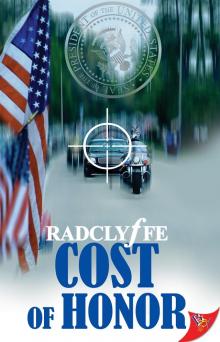 Cost of Honor
Cost of Honor Love on the Night Shift
Love on the Night Shift Top of the Class & Bonus Night
Top of the Class & Bonus Night You Don’t Bring Me Flowers
You Don’t Bring Me Flowers When Dreams Tremble
When Dreams Tremble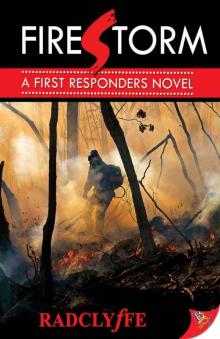 Firestorm
Firestorm The Color of Love
The Color of Love Women of the Dark Streets
Women of the Dark Streets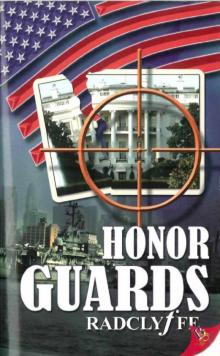 Radclyffe - (Honor 4) - Honor Guards
Radclyffe - (Honor 4) - Honor Guards Honor 03 - Love And Honor
Honor 03 - Love And Honor Love's Masquerade
Love's Masquerade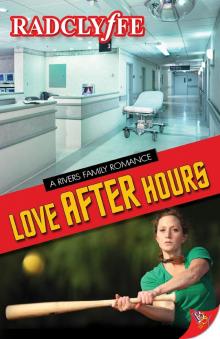 Love After Hours
Love After Hours OMGQueer
OMGQueer A Matter of Trust
A Matter of Trust Honor Under Siege
Honor Under Siege Best Lesbian Romance 2009
Best Lesbian Romance 2009 Honor 06 - Honor Under Siege
Honor 06 - Honor Under Siege Best Lesbian Romance 2012
Best Lesbian Romance 2012 Breathless
Breathless Nick of Time
Nick of Time The Lonely Hearts Club
The Lonely Hearts Club Price of Honor
Price of Honor Word of Honor fr-7
Word of Honor fr-7 Winds of Fortune (Provincetown Tales Book 5)
Winds of Fortune (Provincetown Tales Book 5) Above All, Honor
Above All, Honor Radclyffe - Honor 06 - Honor Under Siege
Radclyffe - Honor 06 - Honor Under Siege Distant Shores, Silent Thunder
Distant Shores, Silent Thunder Word of Honor
Word of Honor Word Play
Word Play Fated Love
Fated Love Homestead
Homestead Radical Encounters
Radical Encounters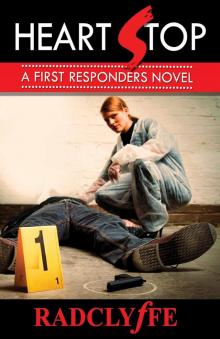 Heart Stop
Heart Stop Code of Honor
Code of Honor Myth and Magic
Myth and Magic Wild Shores
Wild Shores Oath of Honor
Oath of Honor Desire by Starlight
Desire by Starlight Love Burns Bright
Love Burns Bright Promising Hearts
Promising Hearts Helplessly Hers
Helplessly Hers Love & Honor h-3
Love & Honor h-3 All About Us
All About Us Honor 01 - Above All Honor
Honor 01 - Above All Honor Honor 05 - Honor Reclaimed
Honor 05 - Honor Reclaimed Innocent Hearts
Innocent Hearts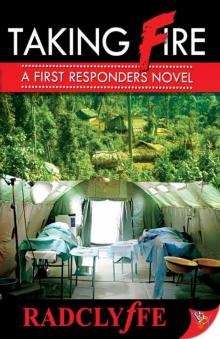 Taking Fire
Taking Fire In Pursuit of Justice
In Pursuit of Justice Love's Melody Lost
Love's Melody Lost Passion's Bright Fury
Passion's Bright Fury Returning Tides
Returning Tides Change of Pace
Change of Pace Safe Harbor
Safe Harbor Night Call
Night Call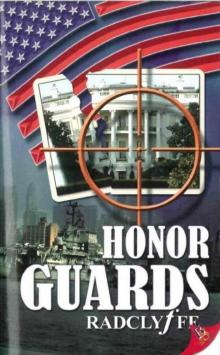 Honor 04 - Honor Guards
Honor 04 - Honor Guards Honor Bound
Honor Bound Cruising the Strip
Cruising the Strip Above All, Honor h-1
Above All, Honor h-1 Honor Reclaimed
Honor Reclaimed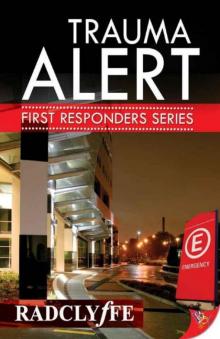 Trauma Alert
Trauma Alert Love On Call
Love On Call Best Lesbian Romance 2014
Best Lesbian Romance 2014 Discovery
Discovery shadowland
shadowland Justice for All
Justice for All Best Lesbian Romance 2011
Best Lesbian Romance 2011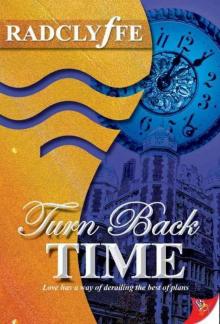 Turn Back Time
Turn Back Time Winds of Fortune
Winds of Fortune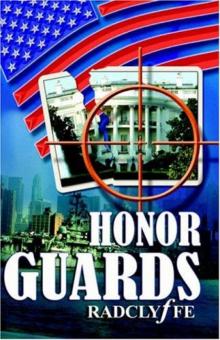 Honor Guards
Honor Guards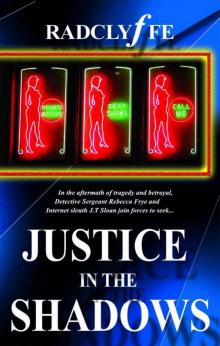 Justice in the Shadows
Justice in the Shadows Love's Tender Warriors
Love's Tender Warriors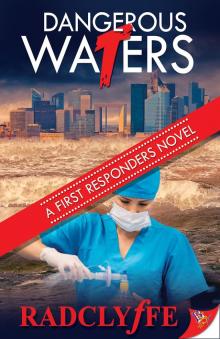 Dangerous Waters
Dangerous Waters First Sight
First Sight By the Light of the Moon
By the Light of the Moon Honor 07 - Word Of Honor
Honor 07 - Word Of Honor Tomorrow's Promise
Tomorrow's Promise Amor and More
Amor and More Best Lesbian Romance 2010
Best Lesbian Romance 2010 Sheltering Dunes (Provincetown Tales Book 7)
Sheltering Dunes (Provincetown Tales Book 7) Love And Honor
Love And Honor Secret Hearts
Secret Hearts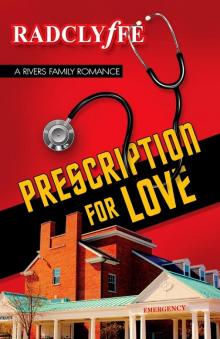 Prescription for Love
Prescription for Love Passionate Rivals
Passionate Rivals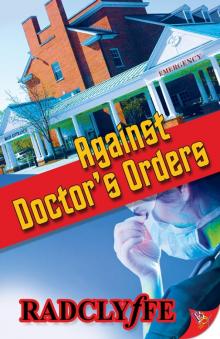 Against Doctor's Orders
Against Doctor's Orders Radclyffe - Honor 01 - Above All, Honor
Radclyffe - Honor 01 - Above All, Honor Honor 02 - Honor Bound
Honor 02 - Honor Bound Beyond the Breakwater
Beyond the Breakwater Radclyffe - (Honor 5) - Honor Reclaimed
Radclyffe - (Honor 5) - Honor Reclaimed Storms of Change
Storms of Change Honor Bound h-2
Honor Bound h-2 Justice Served
Justice Served Sheltering Dunes
Sheltering Dunes Best Lesbian Romance of the Year
Best Lesbian Romance of the Year Secrets in the Stone
Secrets in the Stone